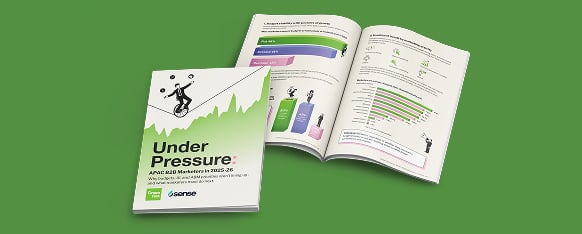I recently had the opportunity to join Logan Lyles of Sweetfish Media as a guest on their B2B show in the US, B2B Growth. On the back of our annual B2B research report, we delved into the criteria for determining best-in-class B2B marketers: customer empathy, technology adoption, Sales & Marketing Alignment, as well as the importance of effective measurement and analytics within the industry.
What were the initial findings of the report?
At the highest level, we discovered that there is a widening gap between best-in-class marketers and the rest of market between two areas: planning and measurement. Best-in-class marketers are those with traits for planning ahead, measuring marketing success and being able to attribute that success to ROI.
We don’t just mean the measurement of ‘vanity metrics’ such as email click-to-opens, click through rates, website visits and so on that many marketers focus on. The best-practise marketers are measuring at a deeper level: campaign attribution, lead conversion, customer reach and content engagement and overall pipeline performance.
How do you get these insights on measurement?
We ask survey respondents which areas they are able to measure with significant accuracy, and the numbers we uncovered are concerning:
- Only 60 per cent can say that they’re measuring lead conversion and pipeline performance
- Just over a third say they’re effectively measuring sales acceptance and follow-up of leads
In comparison, best-in-class marketers are generally twice as likely to measure in these areas, as well as customer reach and engagement, campaign ROI attribution and brand awareness. So for B2B marketers looking to become best-in-class, the key takeaway is to put in a regime around measurement.
Wow, those are staggering. So why is measurement in B2B marketing so hard?
In B2B we’re marketing for “considered purchases”, whereas B2C marketers often deal with transactional ‘on-the-day’ purchases. The B2B funnel is significantly more complex due to these longer, considered lead times and touchpoints, as well as a more complicated attribution process. B2B doesn’t have the data values that B2C does in that there aren’t enough breadcrumbs to follow through the path-to-purchase. Where there might be 200,000 B2C prospects, there may be only 2,000 in B2B.
When you also consider that B2B firms are largely Sales-driven – and their voices often louder than Marketing – who have different expectations around what should be measured compared to marketers, this can create contention between the two business functions.
That’s another area the report found lacking for those non-best-in-class marketers. While half of them say they believe they have strategic alignment in their organisation, the numbers don’t attribute to that. In fact, only 20 per cent say they have an agreed lead management process between Sales and Marketing, as well as:
- Only 30 per cent say that they’ve got an agreed definition of what an MQL is and then leading onto the measurement
- Only 35 per cent said that they had all of their leads followed up by Sales
It’s important to note that the better an organisation’s Sales &Marketing Alignment and the more planned the process from turning a prospect into a lead, the more successful their measurement and outcomes are going to be.
What else can marketers do to help them measure more efficiently?
Have the right data-driven process and technology in place! A lot of what will make the alignment of Sales and Marketing easier and more seamless is the integration of the CRM with the marketing automation system to enable lead flows and closed-loop reporting scenarios.
However, this leads to two challenging areas revealed in the report: skill shortages and analytics. Nearly half of respondents said they had skill shortages around automation tools or people who could run automation tools and smart email systems; another 45 per cent said they lack skills to effectively do their performance management analytics.
So you can see if you haven’t got the right people, processes and integrated technology in place, it’s hard to measure effectively. As Peter Drucker said, “You can’t manage what you can’t measure”.
Are you having trouble measuring and attributing marketing ROI in your organisation? Get in touch with us today!

 Strategy
Strategy





